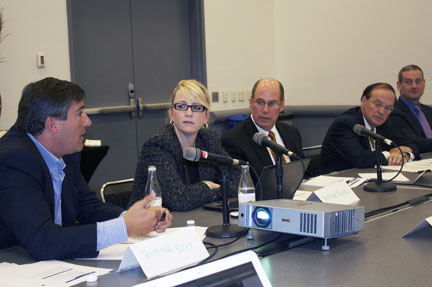DENVER — The tough economy may have been the right catalyst to get in-house legal departments thinking harder about how to control costs and bring more value, according to results of the Association of Corporate Counsel 2011 chief legal officer survey.

This year just half of the respondents to the ACC annual survey indicated the downturn in the economy affected their legal departments, a 20-per-cent decrease from 2009. Of those surveyed, 54 per cent said they experienced effects from the economic downtown, down significantly from the 74 per cent reported in 2009. Of those who answered, 76 per cent said the recession caused more work for their departments compared to 51 per cent in 2009.
To combat the increased workload, inside counsel are taking action — two-thirds of respondents said they are implementing practices to create cost/time efficiencies and/or generate value for their department, either through alternative fee arrangements, increased use of paralegals, contract lawyers or other staff, contract management systems, mandatory budgeting/early case assessment, and other means.
“I do attribute a large portion of what we’re dong to the economy, I don’t think things will ever go back to where they were,” said Jonathan Block, vice president and general counsel with U.S. retailer Hot Topic Inc. speaking as part of the CLO roundtable at the ACC’s annual meeting in Denver on Monday. “I like to think we’ll always be talking about getting value and trying to create value. I think that will be part of the profession of being an in-house lawyer going forward; I don’t think we’ll ever go back to looking at it any differently.”
Some other ways in-house counsel are taking control of outside legal spending including asking for regular and detailed bills and doing post-mortems with outside counsel, said SAP Canada vice president, general counsel, and corporate secretary Barry Fisher.
“We need to know what it is we’re getting for the money we’re paying and focusing on value and the results that have been achieved. It’s important to also have designated points of accountability. Sometimes we lose track of what the law firms are doing because we’re not actively involved in managing that relationship. It’s important to decide early what result you want to achieve and then get a budget and stick to it,” said Fisher.
Fisher said inside counsel at SAP Canada are also encouraged to actively manage their outside legal relationships and are rewarded financially for doing so.
“The problem has really been us — in-house lawyers and chief legal officers,” said Alan Tse, executive vice president and general counsel with Churchill Downs Inc. in Louisville, Ky. “The economy has helped a lot of us see and move the ball forward and once we get smart on this issue we’re not going to go back,”
Apart from controlling costs and managing their outside legal firms, worrying about keeping apprised of company activities that may have legal implications became the No. 1 concern (35 per cent) followed by having too much work for too little budget/resources (19 per cent).
Despite their increased workload and pressures of mounting responsibility, chief legal officers say they are enjoying their jobs. The majority of those responding to this year’s ACC survey — 92 per cent — says they are still satisfied with their chosen career. That number is up from 88 per cent in 2008.
The ACC polled its 5,665 members and 2,905 non-members holding the title of chief legal officer or general counsel in August/September. In total, 1,165 responses were received and of those, 42 per cent of lawyers were employed by private companies, 34 per cent with public companies, and the remainder at non-profits, subsidiaries of foreign companies, limited liability companies. and other organizations.
The survey presented a more global view than past years with more responses coming from outside the U.S. including Canada (seven per cent), Western Europe (11 per cent), Asia/Pacific (nine per cent), Central/South America (four per cent), Eastern Europe (three per cent) and Africa/Middle East (three per cent).
Slightly half of the respondents work in companies with 1,000 or less employees and 54 per cent of respondents were from companies with annual revenue under $500 million.
Watch for Canadian Lawyer’s annual corporate counsel Survey results in the November/December issue of the magazine.

 This year just half of the respondents to the ACC annual survey indicated the downturn in the economy affected their legal departments, a 20-per-cent decrease from 2009. Of those surveyed, 54 per cent said they experienced effects from the economic downtown, down significantly from the 74 per cent reported in 2009. Of those who answered, 76 per cent said the recession caused more work for their departments compared to 51 per cent in 2009.
This year just half of the respondents to the ACC annual survey indicated the downturn in the economy affected their legal departments, a 20-per-cent decrease from 2009. Of those surveyed, 54 per cent said they experienced effects from the economic downtown, down significantly from the 74 per cent reported in 2009. Of those who answered, 76 per cent said the recession caused more work for their departments compared to 51 per cent in 2009.